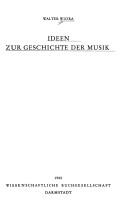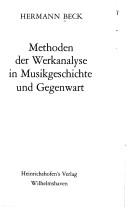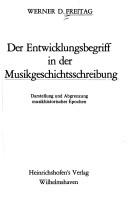| Listing 1 - 10 of 10 |
Sort by
|

ISBN: 3534078160 9783534078165 Year: 1980 Volume: 31 Publisher: Darmstadt: Wissenschaftliche Buchgesellschaft,
Abstract | Keywords | Export | Availability | Bookmark
 Loading...
Loading...Choose an application
- Reference Manager
- EndNote
- RefWorks (Direct export to RefWorks)
History --- Music --- Historiography --- Music - Historiography
Book
ISBN: 9788870968088 9788870965506 8870965503 9788870967326 8870963780 9788870963786 8870967328 Year: 2005 Publisher: Lucca: Libreria musicale italiana,
Abstract | Keywords | Export | Availability | Bookmark
 Loading...
Loading...Choose an application
- Reference Manager
- EndNote
- RefWorks (Direct export to RefWorks)
Musicology --- Music --- Historiography --- Music publishing --- Scholarly publishing --- Musical analysis. --- Manuscripts --- Handbooks, manuals, etc --- Handbooks, manuals, etc. --- Historiography. --- Musicology - Handbooks, manuals, etc --- Music - Historiography - Handbooks, manuals, etc. --- Music - Historiography.

ISBN: 9780754626886 0754626881 9781315090993 9781351557757 Year: 2007 Publisher: Aldershot: Ashgate,
Abstract | Keywords | Export | Availability | Bookmark
 Loading...
Loading...Choose an application
- Reference Manager
- EndNote
- RefWorks (Direct export to RefWorks)
Music --- Musicology. --- History and criticism. --- Historiography. --- 78.17 Tomlinson --- Music - History and criticism. --- Music - Historiography.

ISBN: 3795900840 9783795900847 Year: 1974 Volume: 9 Publisher: Wilhelmshaven: Heinrichshofen,
Abstract | Keywords | Export | Availability | Bookmark
 Loading...
Loading...Choose an application
- Reference Manager
- EndNote
- RefWorks (Direct export to RefWorks)
Music --- Musical criticism. --- Musicology. --- Historiography. --- muziekanalyse --- muziektheorie --- muziekgeschiedenis --- muziekwetenschappen --- muziekkritiek --- Musical criticism --- Musicology --- Musical research --- Research, Musical --- Popular music --- Hermeneutics (Music) --- Music criticism --- Journalism --- Historiography --- History and criticism --- Methods --- Theory, etc. --- Research --- Music - Historiography

ISBN: 3795902592 9783795902599 Year: 1979 Volume: 30 Publisher: Wilhelmshaven: Heinrichshofen,
Abstract | Keywords | Export | Availability | Bookmark
 Loading...
Loading...Choose an application
- Reference Manager
- EndNote
- RefWorks (Direct export to RefWorks)
Music --- -Art music --- Art music, Western --- Classical music --- Musical compositions --- Musical works --- Serious music --- Western art music --- Western music (Western countries) --- Historiography --- Historiography. --- -Historiography --- Musicology --- History and criticism --- Methods --- Theory, etc. --- Music - Historiography
Book
ISBN: 2852032147 9782852032149 Year: 1991 Volume: 26 Publisher: Paris: Champion,
Abstract | Keywords | Export | Availability | Bookmark
 Loading...
Loading...Choose an application
- Reference Manager
- EndNote
- RefWorks (Direct export to RefWorks)
Music --- Musical criticism --- Academic writing --- French language --- Historiography --- Handbooks, manuals, etc. --- Authorship --- Rhetoric. --- 78.88 --- Music - Historiography - Handbooks, manuals, etc. --- Musical criticism - Authorship - Handbooks, manuals, etc. --- Academic writing - Handbooks, manuals, etc. --- French language - Rhetoric.
Book
ISBN: 9782213678498 2213678499 Year: 2013 Volume: *46 Publisher: Paris: Fayard,
Abstract | Keywords | Export | Availability | Bookmark
 Loading...
Loading...Choose an application
- Reference Manager
- EndNote
- RefWorks (Direct export to RefWorks)
Le mot « romantique », si couramment employé aujourd’hui, évoque dans son acception la plus répandue l’effusion et la fièvre lyrique, dont la musique serait l’expression privilégiée. Voilà qui surprendrait bien des musiciens du XIXe siècle. Comment le mot « romantique », qui possédait au XVIIIe siècle une connotation visuelle (renvoyant à la dimension pittoresque des jardins à l’anglaise) et un sens poétique (lié aux romans de chevalerie médiévale), a-t-il pu progressivement qualifier des objets musicaux ? Emmanuel Reibel considère ici le romantisme non plus comme une période, un style ou une mystérieuse essence déterminant les œuvres, mais comme un mot polémique et contradictoire, témoignant d’une nouvelle façon d’entendre la musique.De Rousseau à Berlioz en passant par le style « troubadour », la mode ossianique, l’engouement pour les musiques populaires comme le « ranz des vaches », le rossinisme ou l’école « fantastique », cet essai explore les mutations picturales, mémorielles, nationales et idéologiques impliquées par la « romantisation » de la musique.L’ampleur de la documentation – partitions, traités, correspondances de musiciens et textes littéraires – et une belle élégance d’expression soutiennent une démonstration rigoureuse d’esthétique historique.Ancien élève de l’École normale supérieure, maître de conférences habilité à diriger des recherches à Paris Ouest Nanterre, Emmanuel Reibel est l’auteur entre autres des Musiciens romantiques, fascinations parisiennes (2003) et de Faust. La musique au défi du mythe (2008)
Music and romanticism --- Musique romantique --- Muziek [Romantische ] --- Romanticism in music --- Romantiek in de muziek --- Romantische muziek --- Romantisme en musique --- Music --- Romantisme dans la musique --- Musique --- History and criticism --- Histoire et critique --- Music and literature --- Art and music. --- Historiography. --- Philosophy and aesthetics --- Philosophy and aesthetics. --- 19th century --- Music - Historiography. --- Music - 19th century - Philosophy and aesthetics --- Music - Philosophy and aesthetics.
Book
ISBN: 9780226626925 022662692X 9780226627083 022662708X Year: 2019 Publisher: Chicago : University of Chicago Press,
Abstract | Keywords | Export | Availability | Bookmark
 Loading...
Loading...Choose an application
- Reference Manager
- EndNote
- RefWorks (Direct export to RefWorks)
Stories of Tonality in the Age of François-Joseph Fétis explores the concept of musical tonality through the writings of the Belgian musicologist François-Joseph Fétis (1784-1867), who was singularly responsible for theorizing and popularizing the term in the nineteenth century. Thomas Christensen weaves a rich story in which tonality emerges as a theoretical construct born of anxiety and alterity for Europeans during this time as they learned more about "other" musics and alternative tonal systems. Tonality became a central vortex in which French musicians thought-and argued-about a variety of musical repertoires, be they contemporary European musics of the stage, concert hall, or church, folk songs from the provinces, microtonal scale systems of Arabic and Indian music, or the medieval and Renaissance music whose notational traces were just beginning to be deciphered by scholars. Fétis's influential writings offer insight into how tonality ingrained itself within nineteenth-century music discourse, and why it has continued to resonate with uncanny prescience throughout the musical upheavals of the twentieth and twenty-first centuries.
Tonality --- Music theory --- History --- Fétis, François-Joseph, --- Fétis, François-Joseph, --- Music --- Key (Music theory) --- Keys (Music theory) --- Musical key --- Musical intervals and scales --- Theory --- E-books --- Muziektheorie --- Tonaliteit --- Fétis, François-Joseph (1784-1871) --- 18e eeuw --- Fétis. --- chromaticism. --- music historiography. --- musical modality. --- musical tonality. --- nineteenth-century music. --- non-Western musical scales.
Book
ISBN: 2260662609 2260672604 9791036516511 9782260662600 Year: 2018 Volume: 260 Publisher: Liège : Presses universitaires de Liège,
Abstract | Keywords | Export | Availability | Bookmark
 Loading...
Loading...Choose an application
- Reference Manager
- EndNote
- RefWorks (Direct export to RefWorks)
France --- Frankrijk --- Musique --- Muziek --- Music --- Historiography --- History and criticism --- Early works to 1800 --- Theory --- Historiographie --- Histoire et critique --- Ouvrages avant 1800 --- Théorie --- Historiography. --- History and criticism. --- -Music --- -Art music --- Art music, Western --- Classical music --- Musical compositions --- Musical works --- Serious music --- Western art music --- Western music (Western countries) --- -Historiography --- Théorie --- Musicology --- Methods --- Theory, etc. --- Musicologie (discipline) --- Music - Historiography. --- Music - France - 17th century - History and criticism. --- Music - France - 18th century - History and criticism. --- histoire --- théorie --- musique --- misque --- medieval --- civilisation
Book
ISBN: 131709168X 1283235234 9786613235237 1409420965 9781409420965 1409420957 9781409420958 9781409420958 9781283235235 6613235237 9781315596884 9781317091677 9781317091684 9781138261136 1317091698 1315596881 1138261130 Year: 2011 Publisher: Burlington, Vt. : Ashgate,
Abstract | Keywords | Export | Availability | Bookmark
 Loading...
Loading...Choose an application
- Reference Manager
- EndNote
- RefWorks (Direct export to RefWorks)
What does it mean to think of Western Art music - and the Austro-German contribution to that repertory - as a tradition? How are men and masculinities implicated in the shaping of that tradition? And how is the writing of the history (or histories) of that tradition shaped by men and masculinities? This book seeks to answer these and other questions.
Music --- Masculinity in music. --- Art music --- Art music, Western --- Classical music --- Musical compositions --- Musical works --- Serious music --- Western art music --- Western music (Western countries) --- History and criticism. --- Masculinity in music --- Psychoanalysis and music --- Music and philosophy --- History and criticism --- History --- Historiography --- Music - Europe, German-speaking - 19th century - History and criticism --- Music - Europe, German-speaking - 20th century - History and criticism --- Psychoanalysis and music - History - 20th century --- Music and philosophy - History - 20th century --- Music - Historiography
| Listing 1 - 10 of 10 |
Sort by
|

 Search
Search Feedback
Feedback About UniCat
About UniCat  Help
Help News
News